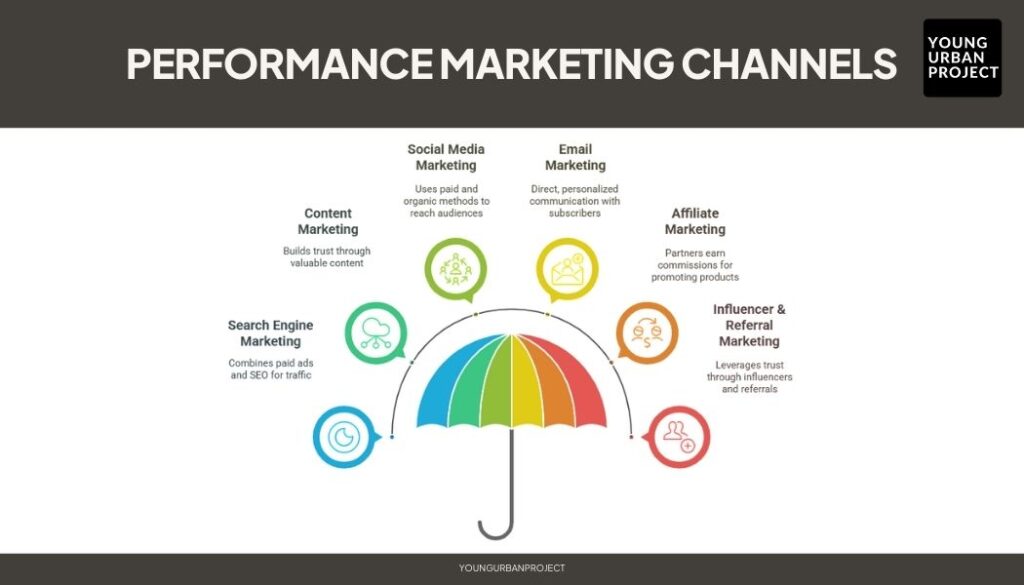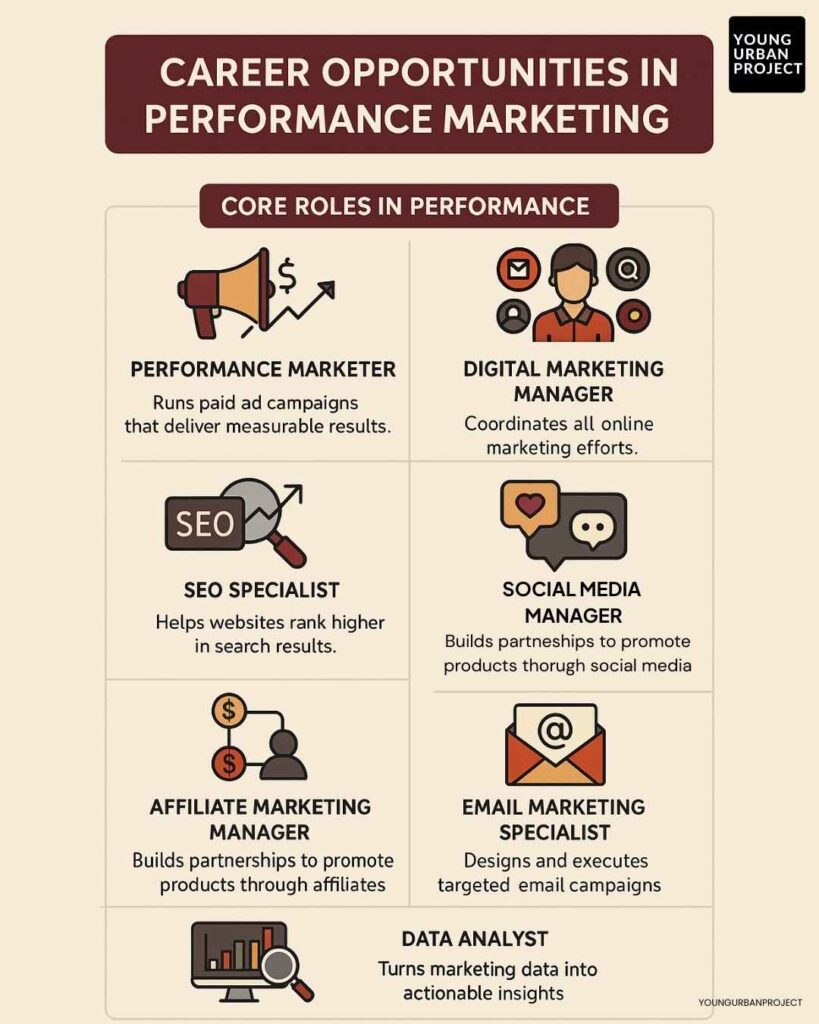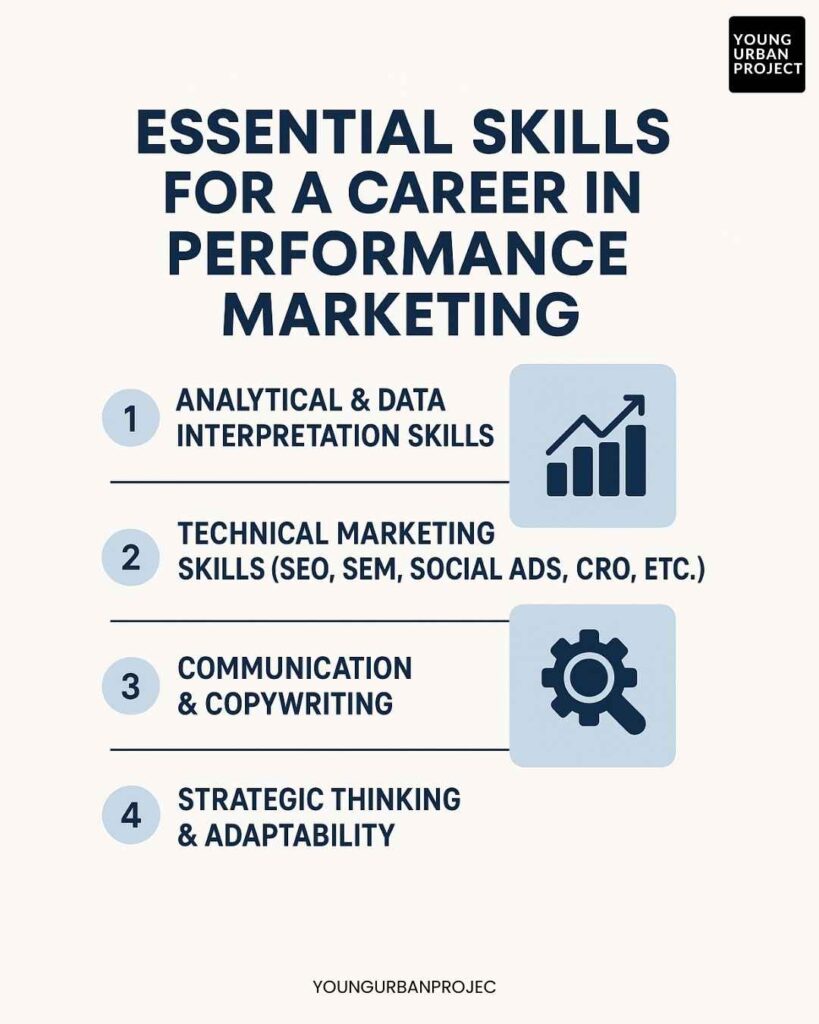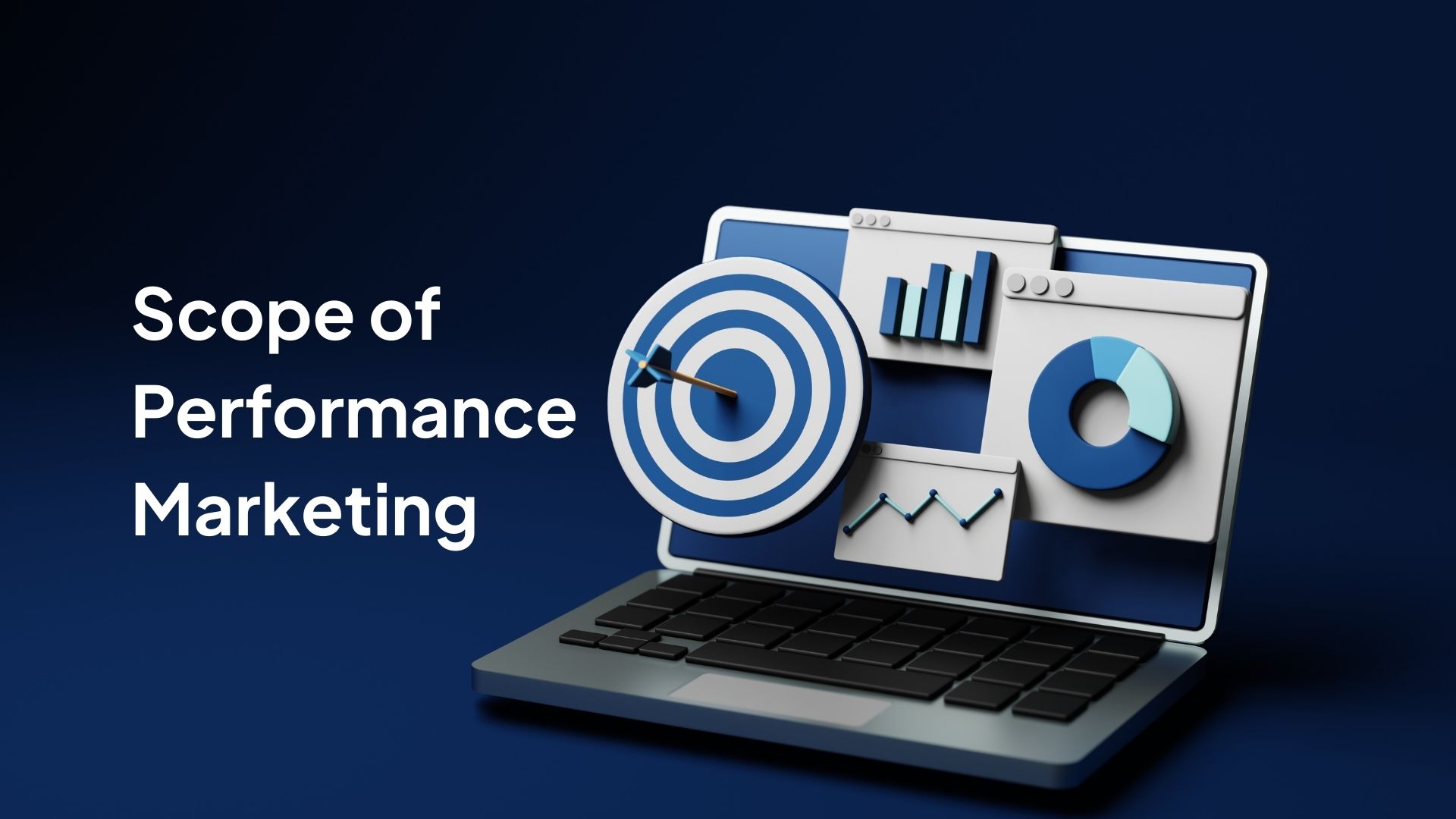Ever wondered why some marketing campaigns hit the jackpot while others burn through budgets with nothing to show? The secret lies in performance marketing—where every dollar spent is tied to measurable results. Unlike traditional marketing’s “spray and pray” approach, performance marketers thrive in a world of clicks, conversions, and ROI. As businesses increasingly demand proof that their marketing investments actually work, careers in this field are booming.
Table of Contents
In this blog, we’ll explore the scope of Performance Marketing, the exploding field of performance marketing, from essential channels like SEM, affiliate marketing, and the best affiliate marketing software to specialized roles commanding top salaries. You’ll discover the skills needed to thrive, training paths to get started, and future trends that will define tomorrow’s marketing landscape. Stop wondering about career options and start planning your future in this results-oriented role.
What is Performance Marketing?
Think of performance marketing like this: it’s online advertising where you only pay when you get a specific result.
Instead of just paying to show your ad everywhere and hoping people see it (like a billboard), with performance marketing, you pay only when someone takes an action you want. This action could be:
- Clicking on your ad
- Signing up for your email list
- Filling out a contact form
- Actually buying your product
The main idea is paying for performance or results, not just for showing up.
How does it work?
Performance Marketing works because everything is tracked online. Businesses set clear goals (like “get 100 new customers”). They run ads on places like Google, Facebook, or through partner websites (affiliates). Special tracking tools watch to see if people who clicked the ad actually complete the goal.
Only when that specific action (the click, the sign-up, the sale) happens, does the business pay the platform or partner who showed the ad.
This means businesses know exactly how much they spent to get each result. They can easily figure out if they are making more money back than they are spending on ads. This focus on Return on Investment (ROI) and measurable results is what makes performance marketing so powerful and popular. Businesses love knowing exactly where their money went and what it achieved.
Key Performance Marketing Channels

1. Search Engine Marketing (SEM & SEO)
SEM utilizes paid ads to secure a spot in search results. SEO improves website ranking organically. Both drive targeted traffic. SEM gives quick results. SEO takes time but offers long-term benefits. Use relevant keywords. Optimize website content. Track performance regularly. Balance both for best results.
2. Content Marketing
Content marketing attracts audiences with valuable content. Blogs, videos, and guides build trust. Focus on solving problems. Keep content relevant and useful. Consistency is key. Measure engagement. Adjust strategy based on data. Good content improves SEO and brand reputation.
Also Read: Performance Marketing vs Brand Marketing
3. Social Media Marketing (Paid & Organic)
Paid social media ads target specific audiences. Organic growth relies on regular posts and engagement. Choose the right platforms. Use visuals and clear messaging. Monitor metrics. Paid ads deliver faster results. Organic efforts build community. Combine both for better reach.
4. Email Marketing
Email marketing sends direct messages to subscribers. Personalization increases open rates. Segment audiences for better targeting. Keep emails short and clear. Include strong calls to action. Test different formats. Track opens and clicks. Avoid spammy content.
5. Affiliate Marketing
Affiliate marketing pays others to promote your products. Partners earn commissions on sales. Choose reputable affiliates. Set clear terms. Track performance. Low risk for businesses. Scales well with the right partners.
Also Read: Types Of Performance Marketing Channels and How to Select the Correct Ones
6. Influencer & Referral Marketing
Influencers promote products to their followers. Referral programs encourage customers to recommend brands. Both rely on trust. Select influencers carefully. Offer incentives for referrals. Track conversions. Works well for niche audiences.
Importance of Performance Marketing
1. The shift from traditional to digital advertising
Traditional advertising methods like TV, print, and radio are losing ground. They lack precise tracking, making it hard to measure success. Digital advertising, on the other hand, provides real-time data on clicks, conversions, and engagement. With more people spending time online, businesses find digital marketing channels more effective. The ability to target specific audiences and adjust campaigns instantly makes digital the preferred choice.
2. Increased business reliance on measurable marketing efforts
Companies now demand clear proof of their marketing ROI. Performance marketing delivers this by tracking every dollar spent and tying it directly to results. Unlike traditional methods, it eliminates guesswork by showing exactly which strategies drive sales. This data-driven approach helps businesses optimize budgets, reduce waste, and focus on what works. As competition grows, measurable marketing is no longer optional—it’s essential.
3. Industry growth statistics
The future of performance marketing looks promising as digital advertising continues to grow. By 2025, digital ads will make up 73% of total global ad spending, increasing to nearly 77% by 2029 (Source). With businesses investing more in measurable marketing, performance marketing roles such as PPC specialists, affiliate marketers, and growth strategists will be in high demand.
Also Read: Ultimate Guide to Performance Marketing
Career Opportunities in Performance Marketing
A. Core Roles in Performance Marketing

1. Performance Marketer
A performance marketer runs paid ad campaigns that deliver measurable results. They pick the right platforms, set budgets, create compelling ads, and track what works. When something isn’t performing well, they make changes fast. They’re always testing new approaches and can explain complex data in simple terms to team members. These marketers need both creative skills to design engaging campaigns and analytical thinking to optimize based on numbers.
2. Digital Marketing Manager
Digital marketing managers coordinate all online marketing efforts. They plan strategies across search, social, email, and other channels to meet business goals. These pros work with different teams and make sure everyone’s efforts support each other. They watch industry trends and adjust plans when needed. While they don’t need to be experts in every tool, they must understand how each channel works and which ones deserve more budget based on performance.
Also Read: Performance Marketing and Digital Marketing: What’s the Difference?
3. SEO Specialist
SEO specialists help websites rank higher in search results without paying for ads. They research what people are searching for and optimize site content to match those queries. These experts fix technical issues that might hurt a site’s visibility and build quality links from other websites. They track rankings and traffic patterns over time. SEO work requires patience – results often take months, not days – but the traffic gained is valuable and long-lasting.
4. Social Media Manager
Social media managers create and run campaigns on platforms like Instagram, TikTok, and LinkedIn. They craft posts that grab attention in crowded feeds, respond to comments, and build online communities around brands. These specialists understand each platform’s unique features and audience behaviors. They track metrics like engagement rates and click-throughs to refine their approach. The best social media managers blend creativity with data analysis to deliver posts that perform well.
5. Affiliate Marketing Manager
Affiliate marketing managers build partnerships with people who promote a company’s products for commission. They find and recruit partners who can reach valuable audiences. These managers create commission structures, provide partners with resources, and track sales from each affiliate. They must balance relationships with results. When done right, affiliate programs can drive significant sales without the upfront costs of traditional advertising.
6. Email Marketing Specialist
Email marketing specialists design campaigns that land in inboxes, get opened, and drive action. They segment subscriber lists to send relevant messages to different groups. These pros test subject lines, content, and sending times to boost performance. They also build automated sequences that nurture leads over time. Despite being one of the oldest digital channels, email consistently delivers strong ROI when handled by specialists who understand how to avoid the spam folder and create value for readers.
7. Data Analyst
Data analysts turn marketing numbers into actionable insights. They set up tracking systems, create dashboards, and dig into performance data. When campaigns underperform, they help identify why. These analysts spot trends that others might miss and can predict which strategies will deliver the best results. While they work behind the scenes, their insights drive critical decisions about where to invest marketing dollars. Good analysts explain complex findings in ways that non-technical team members can understand and use.
B. Specialized & Emerging Roles
1. Growth Marketer
Growth marketers focus on rapidly scaling user numbers or revenue. They try many small experiments across different channels to find what works fastest. These marketers often work with startups and need to deliver results on tight budgets. They’re comfortable with both creative and technical tasks. Growth marketers move quickly, measuring everything and doubling down on successful approaches while dropping what doesn’t work.
Also Read: Growth Marketing vs Performance Marketing: Difference
2. Marketing Automation Specialist
Marketing automation specialists build systems that deliver personalized messages at scale. They create workflows that respond to customer behaviors automatically. These experts work with tools like HubSpot or Marketo to set up complex sequences across email, SMS, and other channels. They understand how to use customer data ethically and effectively. As companies handle more interactions digitally, these specialists help ensure no lead falls through the cracks.
3. Conversion Rate Optimization (CRO) Specialist
CRO specialists improve the percentage of visitors who take desired actions on websites and landing pages. They run A/B tests on elements like headlines, buttons, and page layouts. These experts use heat maps and session recordings to see how real users interact with pages. They make data-backed changes that boost form submissions, purchases, or other conversion goals. Even small improvements in conversion rates can dramatically increase revenue without needing more traffic.
Essential Skills for a Career in Performance Marketing

1. Analytical & Data Interpretation Skills
Performance marketing is all about numbers. Marketers must track clicks, conversions, and customer behavior. Understanding data helps in making better decisions. Tools like Google Analytics help analyze what’s working and what’s not. Without data skills, it’s hard to improve campaigns. A good marketer always tests, measures, and adjusts strategies to get the best results.
2. Technical Marketing Skills (SEO, SEM, Social Ads, CRO, etc.)
Knowing how digital marketing works is essential. SEO helps rank websites on search engines. SEM and social ads bring fast traffic through paid campaigns. CRO (Conversion Rate Optimization) improves website performance. Marketers must understand these tools to create successful campaigns. Platforms like Google Ads and Facebook Ads Manager are widely used. Learning these skills increases job opportunities.
3. Communication & Copywriting
Marketing is about persuading people. Strong writing skills help create engaging ads, emails, and website content. Good communication also helps in teamwork and client interactions. A well-written ad or social media post can boost sales. Simple, clear, and compelling copy makes a huge difference. Knowing what words to use and how to deliver a message is key.
4. Strategic Thinking & Adaptability
Digital marketing changes fast. New trends, algorithms, and consumer behaviors emerge constantly. Marketers must think ahead and adjust quickly. A good strategy focuses on goals, audience needs, and the right marketing channels. If something isn’t working, they must change their approach. Being flexible and always learning is important to stay successful in this field.
Education & Training for Performance Marketing
1. Certifications & Courses
While formal education can be beneficial, certifications are often more valuable in performance marketing. Courses like Google Analytics Academy, HubSpot’s Inbound Marketing Certification, and Facebook Blueprint can provide essential skills. For those seeking a more comprehensive, hands-on learning experience, can check out Young Urban Project’s Performance Marketing Course it offers a structured path to mastering performance marketing techniques. These Performance Marketing courses teach practical skills that companies look for. A certified marketer stands out in job applications.
Also Read: Best Performance Marketing Courses
2. Importance of Hands-on Experience Through Internships & Projects
Practical experience is just as important as theory. Internships help students apply what they learn. Running small campaigns or working on personal projects also builds skills. Many employers prefer candidates with real-world experience. Testing ad campaigns, optimizing websites, or managing social media accounts can provide valuable learning. The more hands-on experience, the better the job prospects.
Future Trends in Performance Marketing
1. AI & Automation in Marketing
AI and automation are changing performance marketing. They help analyze data faster, optimize ads, and personalize campaigns. Chatbots and AI tools improve customer interactions. Automation saves time on repetitive tasks like bidding and reporting. AI takes care of execution, allowing marketers to focus on strategy. Expect more AI-driven insights and real-time adjustments in the future.
2. Omnichannel & Multi-Platform Integration
Customers use multiple platforms, so marketers must connect all channels. Omnichannel strategies ensure a smooth experience across websites, apps, social media, and emails. Data integration helps track user behavior everywhere. Consistent messaging builds trust. Future trends include better Performance Marketing tools to unify campaigns and measure cross-platform performance.
3. Privacy & Compliance Challenges
Strict laws like GDPR and the end of third-party cookies force marketers to adapt. First-party data is now key. Brands must be transparent about data use. Privacy-focused tracking methods, like AI predictions, are rising. Compliance builds customer trust. The future will demand smarter, ethical data practices.
Also Read: Biggest Performance Marketing Challenges & their Solutions
4. Increased Focus on Customer Experience & Personalization
Customers expect relevant, seamless experiences. Personalization boosts engagement and conversions. AI helps tailor content based on behavior and preferences. Fast responses and easy navigation improve satisfaction. Future trends include hyper-personalized offers and smoother user journeys. Happy customers mean better loyalty and sales.
Also Read: Future of Digital Marketing: Trends & Predictions
Conclusion
Performance marketing is a hot field with lots of potential. It’s about making sure every dollar spent on ads brings back a clear result, like a sale or a sign-up. This focus on results makes it really valuable for businesses. There are many different jobs in this area, from running ad campaigns to figuring out how to get more website visitors. You’ll need to know about things like search engines, social media, and how to understand data.
While a degree can be helpful, getting certifications and hands-on experience is often more important. The field is always changing, with new technologies like AI coming in, so you’ll need to keep learning. If you’re interested in a career where you can see the direct impact of your work and are good with numbers, performance marketing is worth checking out.
FAQs: Scope of Performance Marketing
1. What is performance marketing?
Performance marketing focuses on measurable results like sales, clicks, or leads. Advertisers pay only for desired actions (e.g., conversions). It includes paid ads (Google, Meta), SEO, and email marketing. Unlike brand marketing, success is tracked in real time.
2. What jobs are there in performance marketing?
Common roles include:
– PPC Specialist (Google/Facebook ads)
– SEO Analyst (organic traffic growth)
– Affiliate Manager (partner promotions)
– Data Analyst (tracking campaign success)
Salaries range from ₹4L–₹20L+ based on skills.
3. Do I need a degree to start?
While a degree can help, it’s not mandatory. Practical experience, certifications in digital marketing tools, and a strong understanding of data analysis and paid media campaigns can be more important in starting a career in performance marketing.
4. Will AI replace performance marketers?
AI automates tasks (bidding, reports), but strategy and creativity still need humans. Future marketers must adapt to AI tools (like chatbots, predictive analytics) to stay ahead.
5. Is performance marketing growing in India?
Yes! With more businesses going digital, demand for performance marketers is rising fast. E-commerce, fintech, and edtech companies are hiring aggressively.
6. How do I stay updated in this field?
– Follow blogs.
– Join communities (LinkedIn groups, GrowthHackers).
– Test new tools (Google Analytics 4, ChatGPT for ads).
– Attend webinars and workshops.
7. What’s the future of performance marketing?
Trends to watch:
– AI-driven ads (hyper-personalized campaigns).
– Voice/search ads (optimizing for Alexa/Google Assistant).
– Privacy-first tracking (no cookies, more first-party data).

